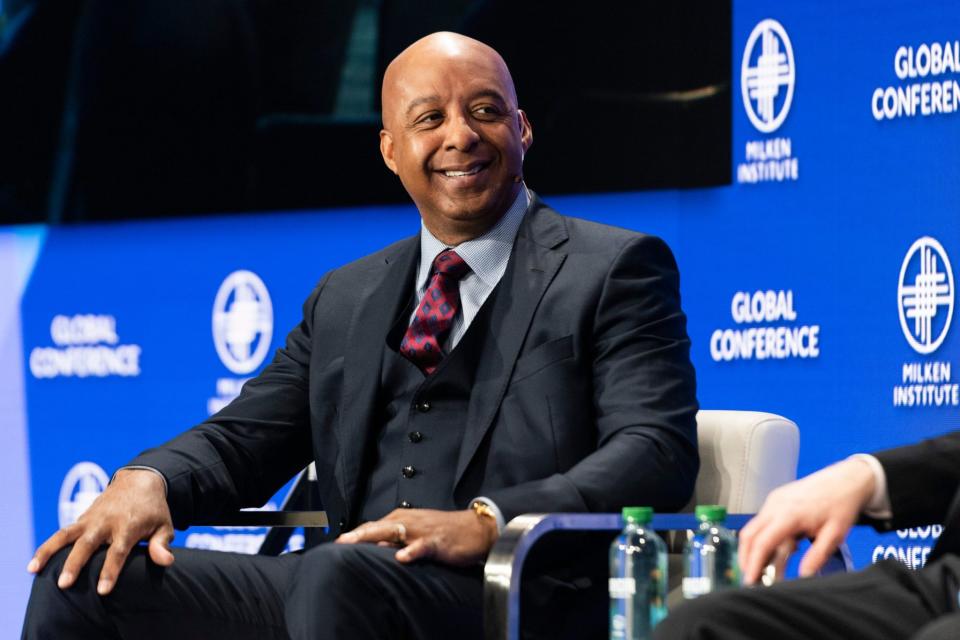Lowe’s CEO went from earning $4.35 an hour at Target to being one of only 8 Black Fortune 500 CEOs with this strategy

Some professionals got their start working in retail—but not nearly as many of those same workers made it all the way to the top of a Fortune 500 company. But Marvin Ellison did.
Ellison got his start making just $4.35 per hour working part-time at Target while he was in college at the University of Memphis. Now he’s president, CEO, and chairman of Lowe’s, a $130 billion home-improvement giant and one of only eight Black Fortune 500 CEOs. While that’s less than 2% of the entire group, it’s a record-high share of Black CEOs on the list.
Reflecting on the fact that he’s only one of a few Black CEOs on the Fortune 500, Ellison said he has mixed emotions.
“On one hand, I feel incredibly privileged and blessed to be in this role because it gives me a chance to hopefully be a positive role model and create a pathway for other people who look like me,” Ellison said in a November 2022 interview with Daymond John, a Black entrepreneur most famous for his hip-hop apparel company FUBU and serving as an angel investor on Shark Tank.
“I’m really disappointed that in 2022 we still have such a significant gap in the capability that exists out there and the opportunities of individuals that look like me to be in a role like this,” said Ellison, who leads a Fortune 50 company with more than 1,700 stores and 300,000 associates in the U.S., according to Lowe’s.
Marvin Ellison’s strategy for defying the odds
Ellison got his start as a part-time employee, but he was “fortunate to land in a company that believed in developing people.” So he “grinded it out for 15 years,” eventually reaching a director-level position at Target before moving into the home-improvement industry.
But what got Ellison to top leadership roles at both retail and home-improvement companies was his drive to differentiate himself from other candidates. He did this by taking on jobs and assignments that “nobody else wanted,” he said.
“I didn’t have great pedigree, I didn’t have an Ivy League education. I didn’t have any stellar international opportunities or stints on my résumé,” Ellison said. “I’m competing against all of these exceptionally talented people on paper; I had to find a way to differentiate myself.”
That strategy drove Ellison up the ranks of Target and on to Home Depot, where he spent 12 years in senior-level operations roles. He also served as executive vice president of U.S. stores for the company from 2008 to 2014, “dramatically improving customer service and efficiency across the organization,” according to Lowe’s. The retail chain snagged Ellison after his intermediary stint as chairman and CEO of J.C. Penney. Ellison also earned his MBA from Emory University and serves on the board of directors for FedEx.
Lowe’s ranks No. 39 on the Fortune 500 and on Fortune’s lists of America’s Most Innovative Companies and the World’s Most Admired Companies. It shouldn’t come as a surprise, then, that Lowe’s is rubbing elbows with Nvidia to develop AI technologies for use in its retail stores. Lowe’s now has more than 50 active AI models used for sourcing logic, inventory planning, and pricing—as well as generally “creating an environment that’s easier to sell, shop, and work.”
“We’re preparing to be at our best when the cycle turns up, and we know that’s going to happen,” Ellison said in a May CNBC interview. “When it happens, we’re going to take meaningful market share based on the work and investments we’ve put into the business.”
How Ellison is paving a path for other Black executives
Ellison’s approach to diversity, equity, and inclusion initiatives look different from other CEOs. While many executives threw money at the issue or made performative hires in the aftermath of George Floyd’s murder in 2020, Ellison is getting more hands-on.
“Talk less and do more,” Ellison said. “I just wanted to fix it. We didn't go out and make some big public announcement. I didn't do a series of interviews. I didn't put any white papers out. I just said, ‘We're gonna fix this by making it a priority.’”
Lowe’s now has a supplier diversity program that helps underrepresented businesses grow and create more jobs, and the company is also a member of several regional supplier diversity councils. But Ellison’s company itself is also prioritizing more diverse hires and professional development.
They “may not be the conventional candidate based on the background you look at,” but Lowe’s has identified core leadership behaviors that employees train people on, Ellison said. “Now we’re creating this pipeline of talent throughout the organization, not based on what your résumé looks like, but based on your results and your leadership characteristics and what you do every day. That’s a transitional change for us.”
This story was originally featured on Fortune.com

 Yahoo Finance
Yahoo Finance 